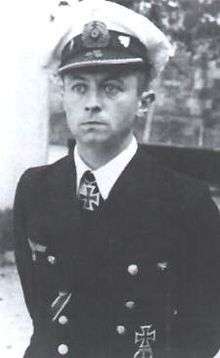Ernst Bauer (Kapitän zur See)
| Ernst Bauer | |
|---|---|
 | |
| Nickname(s) | "Dwarf" |
| Born |
3 January 1914 Fürth |
| Died |
12 March 1988 (aged 74) Westerland auf Sylt |
| Allegiance |
|
| Service/branch |
|
| Years of service | 1933–45, 1955–72 |
| Rank |
Korvettenkapitän (Kriegsmarine) Kapitän zur See (Bundesmarine) |
| Commands held |
U-120 U-126 27th U-boat Flotilla 26th U-boat Flotilla |
| Awards |
Knight's Cross of the Iron Cross Order of Merit |
Ernst Bauer (3 January 1914 – 12 March 1988) was a German naval officer and an U-boat commander in World War II. He commanded the U-boats U-120 and U-126, sinking 25 ships on five patrols, for a total of 118,560 gross register tons (GRT) of Allied shipping, to stand 22nd on the list of highest scoring U-Boat aces of World War II.[1] He was also a recipient of the Knight's Cross of the Iron Cross (German: Ritterkreuz des Eisernen Kreuzes). The Knight's Cross of the Iron Cross was awarded to recognise extreme battlefield bravery or successful military leadership.
Career
Bauer joined the Reichsmarine on 23 September 1933. He served on the light cruiser Königsberg before transferring to the U-boat arm in 1938. He served as watch officer on U-20 and U-37 before commanding the training U-boat U-120 from April 1940. On 1 March 1941, he was given command of U-126, and conducted 5 combat patrols, sinking 25 merchant ships for a total of 118,560 long tons (120,460 t).[1]
On 22 November, Bauer was aboard the auxiliary cruiser Atlantis in the south Atlantic, when she was sunk by the British heavy cruiser HMS Devonshire. U-126 crash-dived, leaving her captain behind, and after Devonshire left the area, she resurfaced to pick up survivors.
From March 1943, Bauer served as training officer in 27th U-boat Flotilla based at Gotenhafen, becoming commander of the unit in October 1944. During the last month of the war, he was transferred to command of 26th U-boat Flotilla at Warnemünde.[1]
Bauer joined the Bundesmarine in 1955 and held several staff positions, before retiring in 1972 with the rank of Kapitän zur See. He died in 1988.[1]
Summary of career
Awards
- Iron Cross (1939)
- Destroyer War Badge (19 October 1940)
- U-boat War Badge (1939) (8 November 1939)
- Knight's Cross of the Iron Cross on 16 March 1942 as Kapitänleutnant and commander of U-126[3][4]
- Mentioned twice in the Wehrmachtbericht on 30 July 1941 and 15 March 1942
- War Merit Cross with Swords
- Officer's Cross, Order of Merit of the Federal Republic of Germany (Bundesverdienstkreuz) (10 November 1971)[5]
Promotions
| Reichsmarine/Kriegsmarine | |
|---|---|
| 23 September 1933: | Seekadett (Midshipman)[6] |
| 1 July 1934: | Fähnrich zur See (Officer Cadet)[6] |
| 1 April 1936: | Oberfähnrich zur See (Senior Ensign)[6] |
| 1 October 1936: | Leutnant zur See (Second Lieutenant)[6] |
| 1 June 1938: | Oberleutnant zur See (First Lieutenant)[2] |
| 1 March 1941: | Kapitänleutnant (Captain Lieutenant)[2] |
| 5 April 1945: | Korvettenkapitän (Corvette Captain), effective as of 1 April 1945 with rank age dated 20 April 1945[2] |
| Bundesmarine | |
| 1 April 1956: | Fregattenkapitän (Frigate Captain)[2] |
| 1 April 1956: | Kapitän zur See (Captain at Sea)[5] |
References
Citations
- 1 2 3 4 Helgason, Guðmundur. "Korvettenkapitän Ernst Bauer". German U-boats of WWII - uboat.net. Retrieved 19 April 2010.
- 1 2 3 4 5 6 7 8 Busch & Röll 2003, p. 200.
- ↑ Fellgiebel 2000, p. 123.
- ↑ Scherzer 2007, p. 204.
- 1 2 Busch & Röll 2003, p. 201.
- 1 2 3 4 Busch & Röll 2003, p. 199.
Bibliography
- Busch, Rainer; Röll, Hans-Joachim (2003). Der U-Boot-Krieg 1939–1945 — Die Ritterkreuzträger der U-Boot-Waffe von September 1939 bis Mai 1945 [The U-Boat War 1939–1945 — The Knight's Cross Bearers of the U-Boat Force from September 1939 to May 1945] (in German). Hamburg, Berlin, Bonn Germany: Verlag E.S. Mittler & Sohn. ISBN 978-3-8132-0515-2.
- Fellgiebel, Walther-Peer (2000) [1986]. Die Träger des Ritterkreuzes des Eisernen Kreuzes 1939–1945 — Die Inhaber der höchsten Auszeichnung des Zweiten Weltkrieges aller Wehrmachtteile [The Bearers of the Knight's Cross of the Iron Cross 1939–1945 — The Owners of the Highest Award of the Second World War of all Wehrmacht Branches] (in German). Friedberg, Germany: Podzun-Pallas. ISBN 978-3-7909-0284-6.
- Scherzer, Veit (2007). Die Ritterkreuzträger 1939–1945 Die Inhaber des Ritterkreuzes des Eisernen Kreuzes 1939 von Heer, Luftwaffe, Kriegsmarine, Waffen-SS, Volkssturm sowie mit Deutschland verbündeter Streitkräfte nach den Unterlagen des Bundesarchives [The Knight's Cross Bearers 1939–1945 The Holders of the Knight's Cross of the Iron Cross 1939 by Army, Air Force, Navy, Waffen-SS, Volkssturm and Allied Forces with Germany According to the Documents of the Federal Archives] (in German). Jena, Germany: Scherzers Militaer-Verlag. ISBN 978-3-938845-17-2.
- Die Wehrmachtberichte 1939–1945 Band 1, 1. September 1939 bis 31. Dezember 1941 [The Wehrmacht Reports 1939–1945 Volume 1, 1 September 1939 to 31 December 1941] (in German). München, Germany: Deutscher Taschenbuch Verlag GmbH & Co. KG. 1985. ISBN 978-3-423-05944-2.
- Die Wehrmachtberichte 1939–1945 Band 2, 1. Januar 1942 bis 31. Dezember 1943 [The Wehrmacht Reports 1939–1945 Volume 2, 1 January 1942 to 31 December 1943] (in German). München, Germany: Deutscher Taschenbuch Verlag GmbH & Co. KG. 1985. ISBN 978-3-423-05944-2.
| Military offices | ||
|---|---|---|
| Preceded by Korvettenkapitän Erich Topp |
Commander of 27th U-boat Flotilla October 1944 – March 1945 |
Succeeded by disbanded |
| Preceded by Fregattenkapitan Helmut Brümmer-Patzig |
Commander of 26th U-boat Flotilla April – May 1945 |
Succeeded by disbanded |
| Preceded by Fregattenkapitän Otto Schuhart |
Commander of the Marinestützpunktkommando Kiel April 1965 – October 1967 |
Succeeded by Kapitän zur See Dietrich Hoffmann |